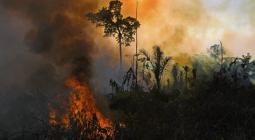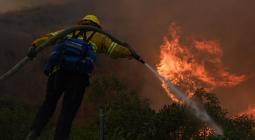We’re Out of Time to Save Ourselves From Extinction.

The climate crisis is already killing us.
Close your eyes.
Imagine it’s the middle of summer. Normally, you’d be relaxing by the pool or going for a stroll on the beach. Not anymore.
Instead, your insides are cooking.
This is not a metaphor.
It’s real.
Your city has spent the last week in a heat wave that reaches a daily wet bulb temperature of 95 degrees Fahrenheit (35 degrees Celsius). That’s the point at which the human body can no longer cool itself. It doesn’t matter if you have a fan, or if you sit in the shade. It doesn’t matter if you’re thirsty, because water doesn’t help. It doesn’t matter if you’re inside. Your air conditioner isn’t running. Your power has gone out again, the result of too many people running their own systems at full blast while streaming Netflix for comfort and trying to mine the last few bitcoins in a desperate, last ditch effort to make enough money to move northward. The grid couldn’t handle it. You don’t know when the power will ever cut on again. You are now absorbing heat from your environment.
Your granddaughter texts, to let you know her mom died yesterday from heat stroke. You quietly sob. You feel like you might throw up. Your head throbs. Blood gurgles through your veins like sludge. You’ve stopped sweating. Your heart feels like a jackhammer in slow motion.
This is how you die, endless sauna.
If you don’t starve first…
We’re almost too late to stop our extinction.
The scenario you just read, we thought it was decades off.
It’s already here.
Check the forecast in Phoenix, Arizona, where temperatures are reaching 113–117 Fahrenheit (45 C) every day this coming week.
A new study by climate scientists shows the earth heating up even faster than we thought. The original goal of the Paris Climate Accords was to keep the planet from warming 2 degrees Celsius, regarded as the point of no return. After that the irreversible damage begins, at least as far as we’re concerned. The earth may heal, after we all die.
I mean everyone. Extinction is at our doorstep, and we really can’t overestimate the threat.
It’s knocking.
It’s calling our name.
It’s not going to happen all at once, like a movie. Heat waves will start hitting some cities harder than others, killing the poor first because they don’t have access to temperature control. The waves will grow in intensity and duration every year. They’ll affect more cities.
Crops will fail, which has already started to happen. Famine will become a norm in more parts of the world.
So will water shortages.
Read this:
Crisscrossing the roadless savannah, I quickly learned that cadavers meant a village was near. Usually they started a few miles out: mainly sheep and goats, but also camels and donkeys drying to leather on the bare, red earth. The previous year, the autumn rains had failed to arrive. The spring rains didn’t come either. Everywhere people told me drought had taken as much as 90 percent of their herds — the primary form of capital in an overwhelmingly pastoral economy. And everywhere I saw people on the move: in desperate search of pasture, or, having already lost everything, of some other source of sustenance. New communities were forming on the edges of the cities, ragged camps of the displaced, once-proud herders reduced to gathering gravel for pennies a day with no prospects ahead but further loss…
In the Horn of Africa, invisibly to most Western eyes, the catastrophe of climate change has already altered everything.
— Ben Ehreneich, The Nation
That’s the world’s future, and it’s coming for you.
Wars will start breaking out over dwindling resources. Warlords and politicians won’t blame climate change, though. They’ll come up with excuses to justify their actions, like the U.S. used “freedom” as an excuse to invade oil rich countries and execute their leaders. There’s endless reasons to hate someone who has what you want.
Extinction events don’t happen in a few days.
They take years, decades.
They’re painful. It’s going to be more painful for us, because we’re an intelligent species who’s gotten used to the idea of having a future, and thinking of something greater than ourselves. Imagine the tsunami of depression and anxiety to come as increasing numbers of us finally see what’s happening, and we realize the jobs we work and the mortgages we’re paying off really have no point anymore.
We’re not prepared.
At all.
There will be no escape.
There will be no escape from the hell coming for us.
Elon Musk won’t escape.
Neither will Jeff Bezos, or any other billionaire foolish enough to invest billions of dollars in manned space exploration and colonization. They’re stuck on this planet just like us, even if they refuse to admit it, even if they sail around the world in super yachts. The only way they’ll survive is by living in big bubbles created right here on earth.
They’ll last longer, not indefinitely.
The rest of us will seek refuge from a shrinking habitable zone. We’ll move inland and north. Some of us will get lucky, for a little while. Raging climate fires and category six hurricanes (previously unthinkable) will decimate the coasts first. Droughts and storms will shred America’s breadbasket, but we’ll probably be able to produce enough food for years to come. Little enclaves of sustainability will endure for a while. Life will be tolerable, not exactly fun, assuming you don’t take in refugees from other areas.
Then there’s the pandemics…
Imagine a new disease jumping from bats or pigs to humans every few years, as predicted by the world’s top scientists. As our natural resources and logistical capabilities erode, consumed by ever increasing numbers of disasters and crises, we lose our ability to get ahead of them. Pharmaceutical companies still roll out vaccines quickly, but they’re only accessible to the richest members of developed nations. So, you get to wear a mask practically year round, just praying you can survive.
Doesn’t that sound like fun?
Life becomes an endless series of hurdles. You endure a pandemic, only to be faced with a severe drought or famine the next year. You survive that, and then you get to deal with an unprecedented tornado season, or a hurricane that comes further inland than any in history. Just when you think you’ve got a handle on life, another climate crisis knocks you on your butt. All the bitcoin in the world can’t save you from this life. At best, you spend your days in a Tesla cyberbunker — looking out at the charred remains of humanity and wishing things could go back to the way they were.
Let’s also be honest for just a minute about those cyberbunkers. They’re not coming. Neither are the cybertrucks, or anything else promised by the super rich. They’ve been lying to you, for money. If they’re lucky, they’ll outlive everyone else by a few years.
Then they’ll die, too.
Alone. Scared.
Unloved.
Millions will still deny climate change.
Look at how quickly climate change got written out of the housing crisis narrative. We’re no longer talking about the Canadian beetle infestation that created a continental lumber shortage, the one brought about by warmer temperatures and milder winters.
Now we’re blaming almost everything else, including the so-called “savings” everyone had from not going out to eat.
Please…
Climate change is already making life significantly more difficult for us on a daily basis. It’s making everything more expensive.
It’s creating scarcity.
Some of us will put the blame where it belongs, the reckless behavior of corporations who spent decades polluting the atmosphere with full knowledge of the consequences.
Others will lie to themselves.
They’ll listen to charlatan politicians who give them easy villains and scapegoats. They’ll point fingers at immigrants and brown people, anyone but their dear heroes of late capitalism. These people will worship anyone who gives them permission to continue impulse buying junk off Amazon and driving around in their monster trucks for fun, eating beef products and throwing trash on the road.
‘Merica.
Don’t cook your kids.
It’s not hopeless.
There’s a lot we can do.
There’s a lot of people already on the ball with plans to mitigate climate change and save humanity, so that you and your grandchildren don’t die of heat stroke in an urban desert a few decades from now.
Here’s what you can do:
Read books like Drawdown. Visit the organization Project Drawdown, and support them. Educate yourself on climate change, and bug the hell out of your friends and family. There are books filled with steps we should be taking on a personal and collective level, from reducing consumption to demanding action from governments and corporations.
The best thing we can do now is to start taking climate change seriously, as if our lives depend on it. (They do.) We should look at throwaway plastic and fossil fuels the same way we look at murder weapons.
They are.
It’s not going to be easy, or quick. It’s going to involve lifestyle changes. It’s going to demand sacrifices to our comfort and convenience.
Frankly, it’s going to suck a little.
We don’t have a choice.
21 June 2021
jessicalexicus





